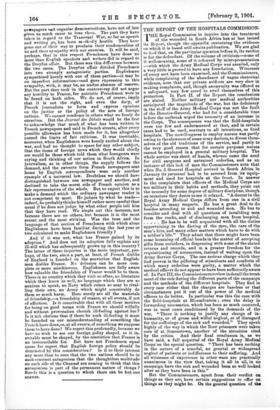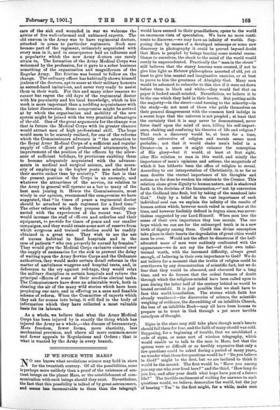THE REPORT OF THE HOSPITALS COMMISSION.
'11HE Royal Commission to inquire into the treatment I. of the wounded in South Africa has at last issued its Report, though the appendix containing the evidence on which it is based still awaits publication. We are glad to fled that, on the particular question before it, its verdict is for the defendant. Of the volume of criticism—some of it well-meaning, some of it coloured by misrepresentation —with which the Army Medical Corps was assailed, only a very little is proved to have any foundation. Witnesses of every sort have been examined, and the Commissioners, while complaining of the abundance of vague rhetorical evidence, note that our private soldiers are very slow in making complaints, and, though anonymity was offered as a safeguard, very few cared to avail themselves of this protection. In Part II. of the Report the conclusions are stated. Neither military nor medical authorities anticipated the magnitude of the war, but the deficiency in the staff of the Army Medical Corps was not the fault of the Director-General, who had for a considerable time before the outbreak urged the necessity of an increase in the Corps. The consequence was that the field-hospitals were too few and undermanned at that, and in certain cases had to be used, contrary to all intentions, as fixed hospitals. The unwillingness to employ nurses was partly owing to the slowness of some army doctors, to divest them- selves of the old traditions of the service, and partly to the very good reason that for certain purposes nurses cannot be employed in a general military hospital. The whole service was short of hands, whence came the need for civil surgeons and untrained orderlies, and as an instance of this lack of men the Commissioners note that when No. 5 General Hospital arrived in South Africa in January its personnel had to be severed from its equip- ment and used for hospitals at the front. In answer to the complaints that officers of the Medical Corps are too military in their habits and methods, they point out the necessity for some degree of military discipline, though on occasions they desire to see it relaxed. "A doctor in the Royal Army Medical Corps differs from one in a civil hospital in many respects. He has a great deal to do besides attending to sick and wounded men. He has to consider and deal with all questions of invaliding men from the ranks, and of discharging men from hospital. He has to be well acquainted with all the duties appertaining to the dieting of the men, the care of the men's kits, and many other matters which have to do with a soldier's life." They admit that there might have been some loosening of official bonds in the matter of accepting gifts from outsiders, in dispensing with some of the stated returns and records, and in a greater freedom for the requisitioning of necessaries, instead of waiting upon the Army Service Corps. The one serious charge which they find proven is the pilfering of stimulants and comforts of which many orderlies were guilty, a matter which the medical officers do not appear to have been sufficiently aware of. In Part III. the Commissioners review in detail the treat- ment of the sick during the different parts of the campaign and the methods of the different hospitals. They find in every case either that the charges are baseless or that circumstances put it out of the power of the medical officers to do better. In particular was this the case with the field-hospitals at Bloemfontein ; even the delay in forwarding necessaries, which has been so much censured, was in most cases conditioned by the demands of the war. "There is nothing to justify any charge of in- humanity, or of gross and wilful neglect, or of disregard for the sufferings of the sick and wounded." They speak highly of the way in which the Boer prisoners were taken care of at Simonstown, another of the atrocities cited by the critics. And their final conclusion is, as we have said, a fall acquittal of the Royal Army Medical Corps on the special question. " There has been nothing in the nature of a scandal, no general or widespread neglect of patients or indifference to their suffering. And all witnesses of experience in other wars are practically unanimous in the view that, taking it all in all, in no campaign have the sick and wounded been so well looked after as they have been in this."
But the Commissioners, apart from their verdict on things as they are, have certain suggestions to offer on things as they might be. On the general question of the care of the sick and wounded in war we welcome the advice of five well-informed and unbiassed experts. The old custom in the Army was to have regimental doctors, attached in peace to particular regiments. Such men became part of the regiment., intimately acquainted with every man in it, and in consequence had an influence and a popularity which the new Army doctors can rarely attain to. The formation of the Army Medical Corps was welcomed by the profession, for it gave to a sober business something of the organisation and magnificence of the Regular Army. But friction was bound to follow on the change. The ordinary officer has habitually shown himself jealous of the doctors, apt to sneer at their military honours as second-hand imitations, and never very ready to assist them in their work. For this and many other reasons we cannot but regret the old days of the regimental doctor with his popularity and his local knowledge, which in his work is more important than a nodding acquaintance with the latest discoveries. Some compromise might be arrived at by which the organisation and mobility of the new system might be joined with the very practical advantages of the old. One of the great arguments for the change was that in future the Medical Corps with its greater chances would attract men of high professional skill. The hope would seem to be scarcely realised, for one of the reforms which the Commissioners advocate is " the attraction to the Royal Army Medical Corps of a sufficient and regular supply of officers of good professional attainments, the improvement of the position of the officers by the allow- ance of sufficient holidays, by provisions enabling them to become adequately acquainted with the advance- ments in medical a❑d surgical science, and the neces- sity of employing in the higher posts men selected for their merits rather than by seniority." The fact is that the present position of the Corps is an anomaly, and whatever the attractions of the service, its relation to the Army in general will operate as a bar to many of the best men joining it. Hence the Commissioners, most wisely in our opinion, recommend the compromise we have suggested, that " in times of peace a regimental doctor should be attached to each regiment for a fixed time." The other reforms which they propose are directly con- nected with the experiences of the recent war. They would increase the staff of officers and orderlies and their equipment, to provide for times of peace and our smaller campaigns, and they would create some sort of reserve from which surgeons and trained orderlies could be readily obtained in a great war. They wish to see the use of nurses habitual in fixed hospitals and in the case of patients " who can properly be nursed by females." They would give the Medical Corps exclusive control over the supply of necessaries for the sick to prevent the delay of waiting upon the Army Service Corps and the Ordnance authorities, they would make certain detail reforms in the matter of ambulance waggons and hospital tents, and, in deference to the cry against red-tape, they would relax the military discipline in certain hospitals and relieve the principal officers of some of their needless clerical tasks. The Commissioners have done an admirable work, both in clearing the air of the many wild stories which have been perplexing our ears, and in offering us a sane and feasible scheme of reform. When the Committee of experts which they ask for comes into being, it will find in the body of information which they have collected a most valuable basis for its labours.
As a whole, we believe that what the Army Medical Corps has been injured by is exactly the thing which has injured the Army as a whole,—the disease of bureaucracy. More freedom, fewer forms, more elasticity, less mechanical precision, and above all more common-sense and fewer appeals to Regulations and Orders : that is what is wanted by the Army in every branch.



































 Previous page
Previous page